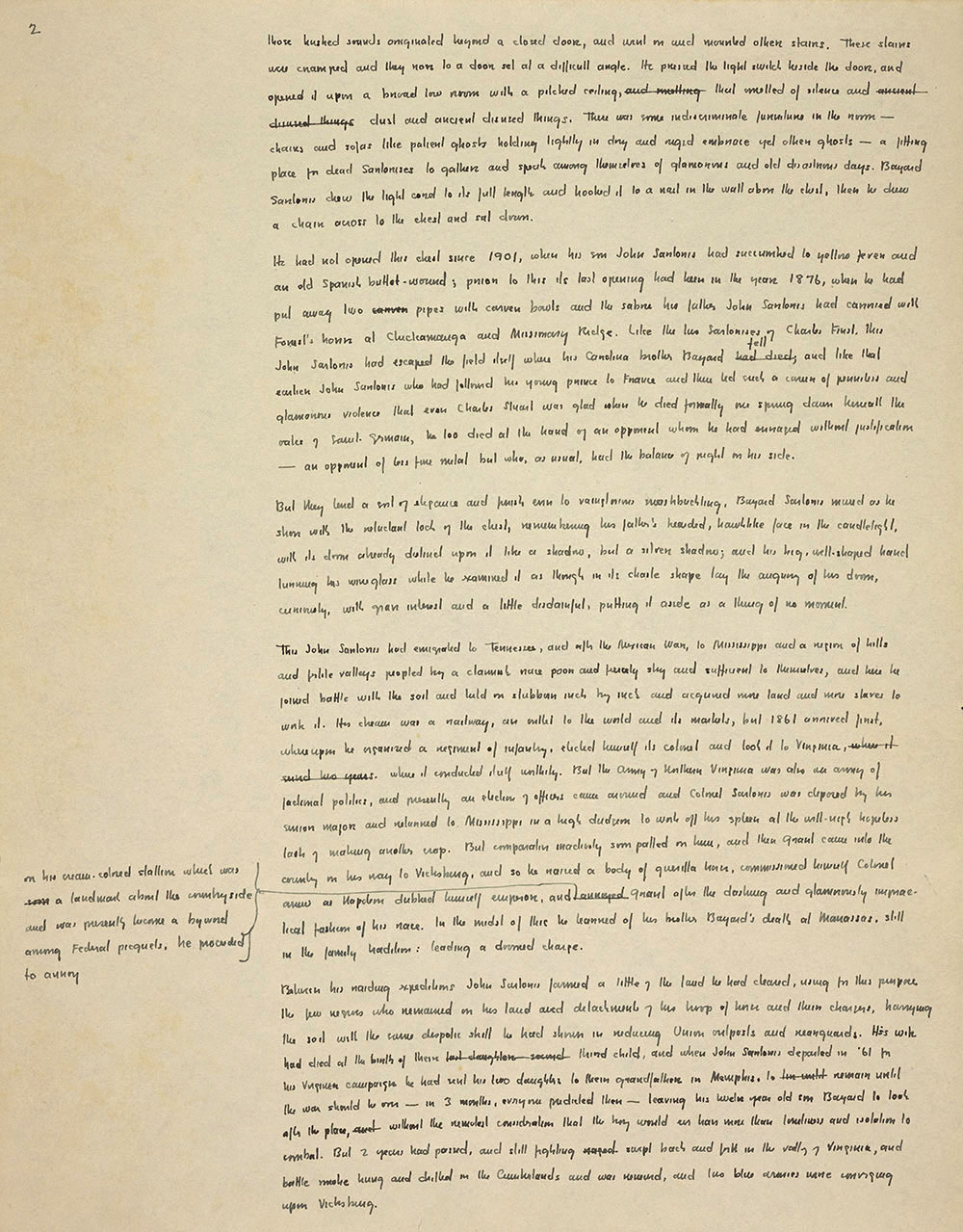TRANSCRIPTION
those hushed sounds originated beyond a closed door, and went on and mounted other stairs. These stairs
were cramped and they rose to a door set at a difficult angle. He pressed the light switch beside the door, and
opened it upon a broad low room with a pitched ceiling, <and smelling> that smelled of silence and <ancient
disused things> dust and ancient disused things. There was some indiscriminate furniture in the room —
chairs and sofas like patient ghosts holding lightly in dry and rigid embrace yet other ghosts — a fitting
place for dead Sartorises to gather and speak among themselves of glamorous and old disastrous days. Bayard
Sartoris drew the light cord to its full length and hooked it to a nail in the wall above the chest, then he drew
a chair across to the chest and sat down.
He had not opened this chest since 1901, when his son John Sartoris had succumbed to yellow fever and
an old Spanish bullet-wound; prior to this its last opening had been in the year 1876, when he had
put away two <carven> pipes with carven bowls and the sabre his father John Sartoris had carried with
Forest's horse at Chickamauga and Missionary Ridge. Like the two Sartorises of Charles First, this
John Sartoris had escaped the field itself where his Carolina brother Bayard <had died,> fell and like that
earlier John Sartoris who had followed his young prince to France and there led such a career of penniless and
glamorous violence that even Charles Stuart was glad when he died formally one spring dawn beneath the
oaks of Saint-Germain, he too died at the hand of an opponent whom he had enraged without justification
— an opponent of less fine metal but who, as usual, had the balance of right on his side.
But they lend a sort of elegance and finish even to vainglorious swashbuckling, Bayard Sartoris mused as he
[illegible] with the reluctant lock of the chest, remembering his father's bearded, hawklike face in the candlelight,
with its doom already distinct upon it like a shadow, but a silver shadow; and his big, well-shaped hand
turning his wineglass while he examined it as though in its chaste shape lay the augury of his doom,
curiously, with grave interest and a little disdainful, putting it aside as a thing of no moment.
This John Sartoris had emigrated to Tennessee, and after the Mexican War, to Mississippi and a region of hills
and fertile valleys peopled by a clannish race poor and fiercely shy and sufficient to themselves, and here he
joined battle with the soil and held on stubborn inch by inch and acquired more land and more slaves to
work it. His dream was a railway, an outlet to the world and its markets, but 1861 arrived first,
whereupon he organized a regiment of infantry, elected himself its colonel and took it to Virginia, <where it
served two years.> where it conducted itself worthily. But the Army of Northern Virginia was also an army of
factional politics, and presently an election of officers came around and Colonel Sartoris was deposed by his
senior major and returned to Mississippi in a high dudgeon to work off his spleen at the well-nigh hopeless
task of making another crop. But comparative inactivity soon palled on him, and then Grant came into the
country on his way to Vicksburg, and so he raised a body of guerilla horse, commissioned himself Colonel
anew as Napoleon dubbed himself emperor, and
[margin: on his cream-colored stallion which was <soon> a landmark about the countryside and was presently become a byword among Federal picquets, he proceded to annoy]
<annoyed> Grant after the dashing and glamorously imprac-
tical fashion of his race. In the midst of this he learned of his brother Bayard's death at Manassas, still
in the family tradition: leading a doomed charge.
Between his raiding expeditions John Sartoris farmed a little of the land he had cleared, using for this purpose
the few negroes who remained on his land and detachments of his troop of horse and their chargers, harrying
the soil with the same despotic skill he had shown in reducing Union outposts and rearguards. His wife
had died at the birth of their <last daughter> <second> third child, and when John Sartoris departed in '61 for
his Virginia campaign he had sent his two daughters to their grandfather in Memphis to <live until> remain until
the war should be over — in 3 months, everyone predicted then — leaving his twelve year old son Bayard to look
after the place, <and> without the remotest consideration that the boy would ever have more than loneliness and isolation to
combat. But 2 years had passed, and still fighting <raged> swept back and forth in the valleys of Virginia, and
battle smoke hung and drifted in the Cumberlands and was [renewed?], and two blue armies were converging
upon Vicksburg.
|


